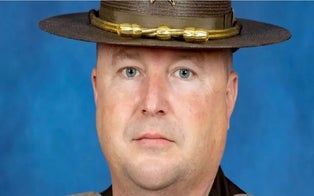"From early on, Betsy knew that she didn't want to suffocate to death in a horrible, ignoble, painful way," a longtime friend said.
Saying "she was done with ALS," the loved ones of a California woman, who took a fatal dosage of medication after a gathering to celebrate her life, are opening up about the artist's "final performance."
Read: Girl, 14, With Spinal Muscular Atrophy Decides to End Her Life: 'This Is Enough Pain'
Betsy Davis, of San Diego, was diagnosed with ALS, or Lou Gehrig's Disease, in July 2013.
"From early on, Betsy knew that she didn't want to suffocate to death in a horrible, ignoble, painful way, which is what ALS does to a lot of people," longtime friend and photographer Niels Alpert told InsideEdition.com.
Her sister, Kelly Davis, said Betsy contemplated from the beginning of her diagnosis a way to end her life before she had to rely on a feeding tube or a ventilator to survive.
When California lawmakers signed the End of Life Option Act, Betsy was given a safe and legal way to receive aid in dying in the form of a lethal dosage of medication.
Kelly told InsideEdition.com, "She had suffered so much. She was in constant pain, constant discomfort."
Just after the new law came into effect, Betsy decided on a weekend, July 24, and invited more than 30 of her friends and family to join her in one final hurrah.
"People knew this was something that was going to be in her future," Kelly said. "She sent out an email letting people know it's going to be a big party — all weekend long — at her place."
"The mood of everyone was very loving, very supportive," said Alpert, who photographed the weekend. "While there were a lot of smiles and laughter and joy, behind all that, everybody knew what was coming."
Read: Nurses Inspire Bride With Terminal Cancer to Continue Treatment After Throwing Her a Wedding
According to Kelly, "People were just very present and enjoying being with her. They're all about capturing that moment.
"Not to say no one was getting choked up, but it was very minimal," Kelly said. "Mostly, people were just having fun, finding reasons to be silly, telling stories. They wanted to make Betsy laugh."
As the weekend drew to a close, Betsy said her last goodbyes to her guests, and put on a silk yukata — a casual version of a kimono — that she had purchased from Japan in her final trip with Alpert a year after she was diagnosed.
"It came from a 190-year-old ryokan (guest house) in Kyoto," Alpert explained. "We had a really special time there. We just came away from that trip deeply touched."
Her wheelchair was then positioned on a hillside overlooking the sunset, and the 41-year-old artist prepared to take her lethal combination of morphone, pentobarbital and chloral hydrate.
Kelly said the doctor had ground the mixture into a fine powder and mixed it with the morphine.
To try to mask the flavor, she said they consulted a bartender friend, who recommended mixing it with coconut milk, sugar and a pinch of salt.
"She didn't comment on what it tasted like. I think we did our best to make it palatable," Kelly said.
Doctors said Betsy would have to finish the mixture within five or six minutes for it to be effective, or else she would risk falling into a prolonged coma, one she would ultimately wake up from.
"We were trying to get it almost like a Jello for her to swallow, but the Jello didn't set," Kelly joked, "so it was more like a milkshake."
In her final moments, Kelly said her sister was calm and focused on finishing the concoction.
Read: 3-Year-Old Boy Battling Terminal Cancer Sworn In as Honorary FDNY Firefighter
"I think she was envisioning this as a final art work, a final performance," Kelly speculated in an interview with InsideEdition.com. "Betsy wanted to show people a different concept of death and what laws like this allow somebody to do."
As she later reviewed Alpert's photos of the event, Kelly told InsideEdition.com she thought her sister looked so cheerful in the hours before her death because, "she knew she wouldn't have to go back to that stupid bed later that night. She was free."
Watch: 6-Year-Old Girl With Fading Eyesight Makes Lifetime of Memories While Her Vision Lasts





